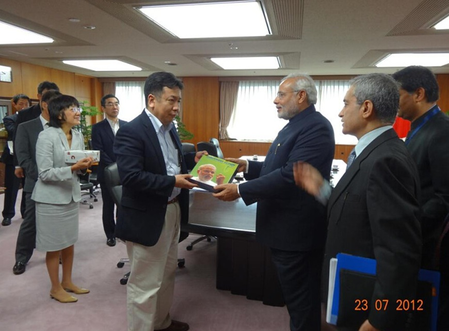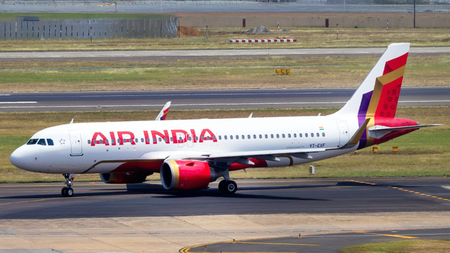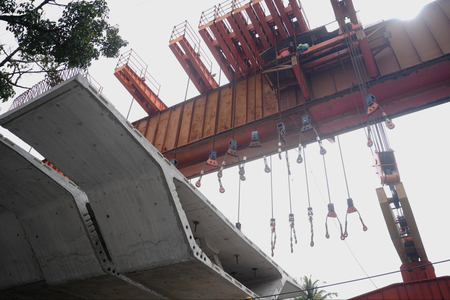
New Delhi, Aug 29 (IANS) Prime Minister Narendra Modi, currently on a two-day visit to Japan, will attend the 15th India-Japan Annual Summit in Tokyo on Friday, where the two Prime Ministers will review the entire spectrum of bilateral ties and discuss ways to take forward the next phase of the Special Strategic and Global Partnership.
PM Modi made several visits to the island nation, as Gujarat Chief Minister, during which he discovered the huge potential of bullet trains on the nation’s economy, held interactive sessions with ‘Gujarat samaj’ and also earned the title of ‘business-friendly leader’, owing to his persistent thrust on growth and development.
Narendra Modi set foot in Japan as Gujarat Chief Minister for the first time in April 2007, leading a 40-member delegation of bureaucrats and industry leaders. In the six-day tour of Tokyo, Osaka, Hiroshima, and Kobe, CM Modi courted corporate giants — Mitsubishi, Mitsui, Sumitomo, Marubeni, Suzuki, Toshiba, Nippon Steel, Nissan Steel, Unido, and Tsuneshi Shipbuilding and secured MoUs between JETRO and Gujarat’s Industries Department.
During this trip, Narendra Modi met then Japanese Prime Minister Shinzo Abe and discussed the Delhi-Mumbai Industrial Corridor (DMIC). CM Modi presented Abe with a CD on Gujarat’s Buddhist heritage sites and a handwoven tribal shawl, and also invited him to Gujarat. Abe, in turn, assured Modi of Japan’s full support for Gujarat’s stretch of the DMIC.
One of the most iconic moments of this visit was the then CM Modi stepping into the cockpit of the Japanese Bullet Train. That seed of an idea in 2007 is blossoming years later into the Mumbai-Ahmedabad Bullet Train project, the flagship of Indo-Japanese cooperation.
During the trip, Narendra Modi also walked through the Peace Memorial Park and Museum in Hiroshima, pausing to absorb the lessons of history. In Kobe, he attended a cultural programme at The India Club, which has been a bridge for the Indian diaspora since 1904. This 2007 visit significantly expanded business and cultural relations between Gujarat and Japan.
In July 2012, he went to Japan, this time not just as Gujarat Chief Minister but as a leader whose reputation had begun to transcend state boundaries. His five-day visit from July 22-27 was at the formal invitation of the Government of Japan — a rare honour, accompanied by a Cabinet-rank reception, usually reserved only for heads of government.
Narendra Modi, heading a high-level delegation of top officials and industrialists, would go on to attend 44 programmes across Tokyo, Hamamatsu, Nagoya, Osaka, and Kobe — an unprecedented schedule for a state chief. He met leading ministers and then Deputy Prime Minister Katsuya Okada, and also held discussions with Governors like Hideaki Omura of Aichi Prefecture and Toshizo Ido of Hyogo Prefecture.
At JETRO’s investment seminars in Tokyo, Hamamatsu, and Nagoya, then CM Modi spoke of Gujarat’s transformation into a power-surplus, investor-friendly state. He highlighted infrastructure, ports, logistics, and industrial corridors as Gujarat’s big bets for the future.
Business meetings included a significant session with Osamu Suzuki, Chairman of Suzuki Motors, where Modi pitched Gujarat as Asia’s next automotive hub. He later toured Suzuki facilities, interacted with Indian engineers working in Japan, and shared lunch with Suzuki himself.
Amidst the diplomacy, there was also space for culture. Narendra Modi addressed the Gujarat Samaj of Japan in Tokyo and met with members of the India Centre Foundation. At the India Club in Kobe, a historic institution of the diaspora, he engaged with the Indian and Gujarati community, strengthening emotional bonds. He also enjoyed a boat ride at Kobe port, symbolic of friendship across waters.
The Japanese establishment was impressed, and so was its media. The country’s largest business daily, Nikkei, ran a 742-word feature describing Narendra Modi as the “business-friendly leader” and even called him “a strong contender for India’s Prime Ministership in 2014”.
Ambassador (then) Akitaka Saiki, one of Japan’s most accomplished diplomats, called Modi “different from other CMs” because of his “speedy governance”.
At a time when Japanese investors were wary of instability elsewhere in India, Modi’s growth pitch stood out. A phrase became increasingly popular: “Modi Means Business”.
–IANS
mr/dpb




